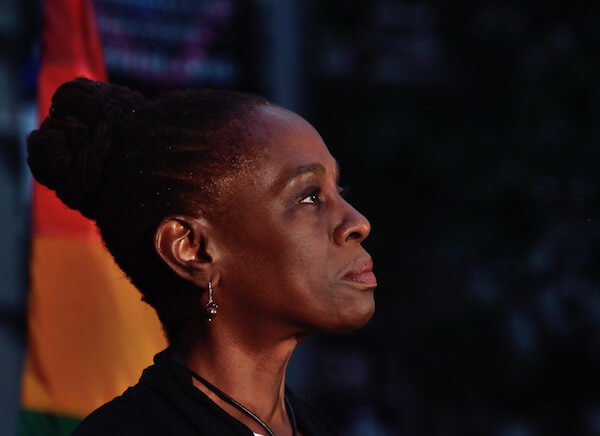Democrats should choose between the voters and its donors.
A party that represents the cosmopolitan and successful will fail unless it listens to the grievances of those on wrong side of income inequality. Roosevelt made the Democratic Party the party of working people. Obama managed to sustain that link in his two presidential runs, but it was lost during the campaign of 2016. Will Democrats win it back in 2018?
The metaphor of the glass ceiling illuminates the dilemma faced by the party last year. A University of California Hastings College of Law professor in San Francisco offered this explanation for Clinton’s failure to win the votes of white working-class women. They “saw Hillary Clinton as another privileged white women wanting to break the glass ceiling,” said Joan C. Williams. “That metaphor makes sense if your central goal is to gain access to jobs that privileged men have. Hillary’s feminism was not about them.”
THE LONG VIEW
The brouhaha about Russian hacking is a distraction. What will elect Democrats in the 2018 congressional races is fighting income inequality. And the battle must be waged in states now run by Republicans. Unless Blue candidates can capture congressional majorities, the nation will endure continuing dischord while racist, even dictatorial forces control the public dialogue. Making Putin the issue while neglecting income inequality is a recipe for defeat.
Eight years after the Great Recession started, the economy is still not running at full capacity.
“Labor force participation rates remain significantly below their 2000 levels — in fact, lower than they have been since 1978,” Nobel Prize-winning economist Joseph Stiglitz, urging a spending program that would tighten the labor market and raise wages. “More rapid growth accompanied by higher employment would reduce inequality and increase future growth potential,” he asserted in a report for the Nation Institute originally commissioned to prod a presumed Clinton presidency in a leftward direction.
But stimulating the economy is opposed by conservatives, who argue that after years of gradual growth the economy is at full employment and inflation is dangerous.
The Democratic Party must cut through the noise of these claims. Only new spending will generate a rise in wages, and advocating for that will show that Democrats are behind a populist economic approach to help both people of color and whites who currently face long odds in the job market. For too long, Democrats have accepted neo-liberal arguments that in order to stay “competitive,” the nation must keep wages low.
Beware of those leaders who voice empathy for Americans who are struggling without talking money. Empty promises will not sway those at the bottom of the ladder. Their votes for Trump show their deep hunger for results.
Higher education must not only be tuition-free, it must also include stipends that defray living expenses. We did that under the GI bill following World War II, and we must do it again if we are to retrain blue collar and poor Americans for the 21st century.
Political donors –– to both parties –– must pay a greater share of the freight. Social Security deductions should continue past the current cutoff of $118,500 a year if we are to raise Social Security payments; tax loopholes must be closed; trades in stocks and bonds must be taxed just as the purchases of soda and batteries are taxed. Making a government of the people, by the people, for the people requires increased revenue. Part of the increase in social spending can certainly be accomplished by lower expenditures on defense and prisons. A wholly unnecessary plan to modernize atomic weapons should be scrapped.
This is the language of a Democratic Party that will succeed by abandoning neo-liberalism and insisting that those whose incomes have leapfrogged average Americans’ give back to their communities.
Harvard political scientist Michael Sandel pointed out that the defeat of the Democrats mirrors the fate of center-left parties in Europe, which must change “their mission and purpose,” as well. They must all demonstrate the discipline to “learn from the populist protest that has displaced them –– not by emulating its xenophobia and strident nationalism.” The new task is taking “seriously the legitimate grievances.” It means “recognizing that the grievances are about social esteem, not only about wages and jobs.”
Still, wages and jobs are no small part of the picture. Between 2004 and 2014, US manufacturing jobs fell by more than two million, according to the federal Bureau of Labor Statistics, and now account for just over eight percent of total employment, continuing a long slide since the 1950s.
Calling Trump voters fascists or seeing them as hostile aggressors rather than people whose communities have been passed over by the digital economy will drive voters into the Republican Party. My friends who bought co-ops on the Upper West Side on the cheap in the 1970s and now sell them for prices above $1.5 million live in a different economy from those in Youngstown, Ohio, home to Representative Tim Ryan. When he challenged Nancy Pelosi in November for leadership of the House Democrats, he pointed out that property values in his town have stagnated over those same years. Even after decades of home ownership, these hard-working Americans saw no increase in their wealth.
“The election exposed an enormous gap between big city voters and non-big city voters,” Harvard University sociologist Theda Skocpol has pointed out. “Clinton enjoyed wide support in the big cities, while Trump won voters from all classes outside the big cities. America is actually a federated polity where electoral geography matters more than ethnic or class aggregates.”
The LGBTQ community has a big part to play in helping the Democratic Party reshape both its policies and its image. Few communities have made more progress in changing the social esteem they enjoy, even while dealing with challenges from a deadly epidemic to issues like substance use that today affect broad swaths of American society. And queer people have a large voice in the nation’s cultural conversation –– from art to the stage to television and film. Plays and art should represent a broader range of experiences, and new television shows need not all be about people living in white bread suburbs and chic gentrified urban enclaves.
Unless we can change the conversation about how progressive politics are joined to the lives of Americans facing economic dislocation, the Democratic Party will be confined to a small number of states, with reduced influence over how the nation is governed.



































